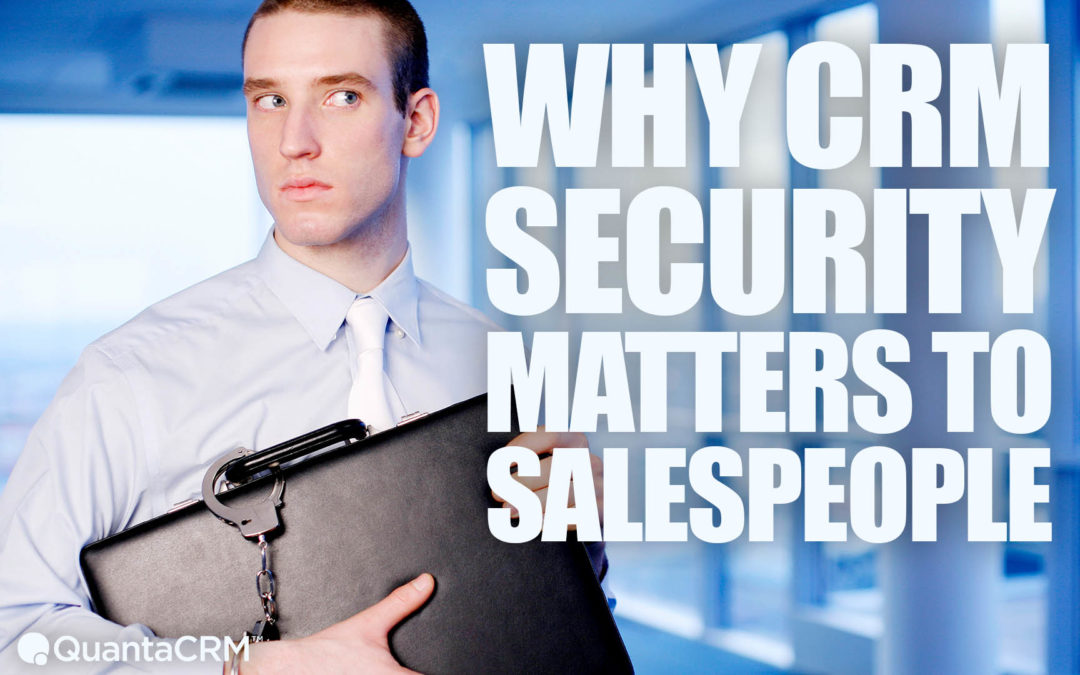CRM security is extremely important to creating and maintaining an effective CRM system and database. But most of the time, we talk about CRM security from the manager’s perspective. That makes sense, to a point. After all, the managers are typically the ones in charge of setting up that security.
The thing is, salespeople are the ones most affected by CRM security settings. As a salesperson, you are on the front lines with prospects and customers, and therefore will be the most frequent users of your CRM system. CRM security matters to salespeople.
So why is that? Two main reasons: access, and security. Salespeople need easy access to important records, but you also need to feel secure in the knowledge that your information is secure.
Part 1: Access
One of the most common complaints from salespeople is that CRM gets in their way.
That’s a huge problem. CRM should be making things easier, not harder!
A very common cause of this complaint is poor security implementation. We’ve seen too many systems over the years that lock salespeople out of some of the very things they need to do their jobs!
As a salesperson, you will be using CRM records more than pretty much anyone else. That means you need easy access to the CRM information and functions that will help you sell.
That makes well-thought-out CRM security a must. After all, an impenetrable security web around your records is pretty useless if it keeps you out, too.
Most CRM systems use some combination of role-based and record-based security to grant privileges to users. This should enable your organization to ensure those who need something have access to it, and those who don’t do not.
If your organization uses Microsoft Dynamics 365, for example, they can create business units, teams, and security roles that essentially re-create that organization.
Once the organizational structure is in place, privileges and access levels can be given to individual records, record types, and/or those business units, teams, and roles.
In Dynamics 365, there are 8 basic record-level privileges:
1.) Create enables you to make a new record.
2.) Read enables you to open and view a record.
3.) Write enables you to make changes to a record.
4.) Delete enables you to permanently erase a record.
5.) Append enables you to associate another record to the current record.
6.) Append to enables you to associate the current record to another record.
7.) Assign enables you to give ownership of a record to another user.
8.) Share enables you to grant access to a record to another user.
And for each of these privileges, Dynamics 365 uses 5 access levels:
![]() Global allows access to all of an organization’s records.
Global allows access to all of an organization’s records.
![]() Deep allows access to all records in your business unit and in subordinate units.
Deep allows access to all records in your business unit and in subordinate units.
![]() Local allows access to all records in your business unit.
Local allows access to all records in your business unit.
![]() Basic allows access to records you own or are shared with you or one of your teams.
Basic allows access to records you own or are shared with you or one of your teams.
![]() None allows no access to records.
None allows no access to records.
The right balance of privileges and access levels across units, teams, and roles should ensure you have an ideal mix of access and security. Done poorly, and you could face unnecessary obstacles to your sales process, insecure records, or both.
That is why it is critical for salespeople to make their needs known early and often! If you don’t have access to something you need, then you need to know who to talk to to get that access.
Part 2: Security
Of course, the flip side to access is security. Many salespeople worry that CRM will enable others to steal their leads and accounts. And if your pay is primarily commission-based, this is a big, big deal.
A well-implemented CRM does improve records access and collaboration, but not by simply ignoring data security.
If your CRM security is properly set up, then access rights should be exactly the same as they were without CRM.
Access is easier for users who have those access rights. But if you aren’t collaborating on a prospect or account, other members of the sales team shouldn’t be able to snipe that prospect or account.
This is an important feature of CRM, and one that sometimes gets lost as salespeople hear words like “collaborate” and “share” when they’re used to chasing down leads (and commissions) solo.
If someone does steal your records, then you either have poor CRM security settings, or you have coworker and/or culture problem.
And if your CRM security is designed to create collaborative prospecting and sales but your compensation package doesn’t account for those group efforts, then something has to give or it’s time to polish up that LinkedIn profile!
But wait, there’s more…
For more on CRM security, check out our CRM security archive!
And for more on how CRM can benefit salespeople, check out the rest of our CRM for Sales series, or browse our complete blog archive!
Sell better, faster, and smarter with Dynamics 365 CRM
Microsoft Dynamics 365 for Sales CRM offers tons of tools for salespeople to boost their sales.
Plus, our OnTrack CRM Success System and the OnTrack Wall of Value help you get the most from your CRM, whether you're a fresh CRM novice or a seasoned CRM veteran!
What can you do with more powerful sales tools at your fingertips?
Was this post helpful? Enjoyable? Do you have feedback or additional questions? Let us know in the comments, or contact us directly. We’re here to help!

